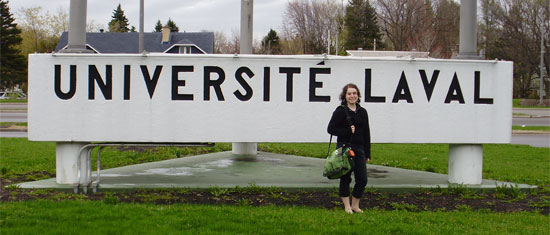 |
| Dal student Rebecca Schneidereit is learning French through the Explore program. |
I started French classes in first grade and barely made it beyond “bonjour.” In junior high, I rationalized this by saying I’d Never Need French. Turns out I was wrong. During a post-high school tour of Europe, my best friend and I stayed with her family in France, where I was reduced to communicating with grunts and gestures, cavewoman-style. It wasn’t an especially social two weeks.
I thought taking English in university would protect me from beckoning bilingualism; again, not the case. I recently attended a lecture on Shakespeare in Enlightenment France. French quotes from early translations left other attendees in hysterical laughter, while I faked a grin, wishing I got the joke.
I’m no longer in denial; I need French skills, stat. But by this point, a couple hours of language instruction each week won’t cut it. Then, rushing into the McCain one morning, I noticed a table promoting “Explore” – a bursary program to help non-Francophone high school and university students learn French. I grabbed an application from the table and hurried to class. Now my semester at HÂţ» is done, my bags are half-packed, and I leave for Universite Laval, Quebec City, Friday morning.
(the Council of Ministers of Education, Canada) is responsible for . Their website sums the program up: “Discover another region of Canada and use this opportunity to improve your knowledge of French. Explore offers you five weeks full of opportunities to make discoveries, meet new people, and exchange ideas in a stimulating setting for learning your second language.”
Previously known as the Summer Language Bursary Program, Explore has been offered since 1971. Spring and summer sessions are available; applicants pick the more convenient season, as well as which Canadian universities they’d like to study at. The website states that “the educational institutions were chosen for their high-quality programs. The cities were chosen because they offer excellent French-speaking environments.”
Students may stay with a host family or in a university dorm; I’m opting for the latter since, as a day student, I’ve never had the “residence experience.” Room, board and classes are completely covered – a value of $2,000. There’s just one catch; for the five weeks students spend in Explore, nary a word of English may pass their lips. Not all Explore students will be speaking French at the same level – a proficiency test is conducted to place students appropriately – but they will all be speaking French.
It sounds daunting, but Explore alumni give a glowing report of their experiences. “Explore was probably one of the best experiences for me,” says Shannon Stoodley, who recently completed the bursary program. “I met people from all over Canada, which was cool. Also, I learned how to speak French in different situations… There were always tons of activities to do, and plenty of people to hang out with.”
But would she recommend it? “The program is just tons of fun… if you ever get the chance to go, do it...don't hesitate.”
So now I’m sitting by my half-filled suitcase, wondering which tee shirts to pack (does it count as speaking English if your shirt says “GORILLAZ?”) I’m excited, intrigued and a little terrified. But for Dal students who know French was never their strong suit – or, alternately, students who love HÂţ»â€™s French program, or some other language, and want to do more – Explore constitutes the perfect summer vacation.
Applications can be downloaded at , and second-time applicants are also considered.
I’m nervous, but acquiring French will be invaluable to my grad work, my experiences as a Canadian, and my personal education. Who knows? Post-Explore, maybe I can celebrate my next vacation in France through the ability to finally order a sandwich.
